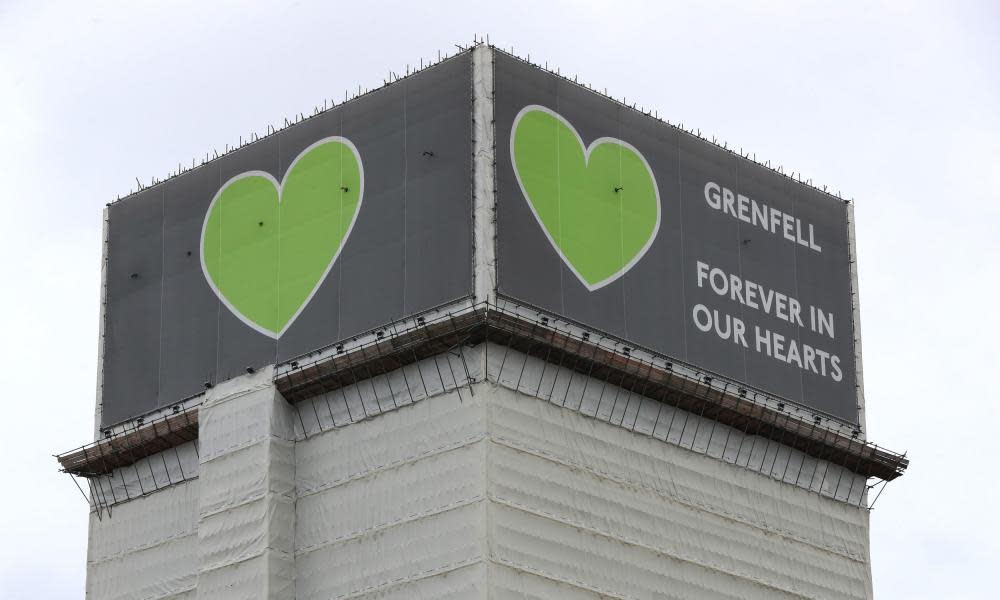Grenfell inquiry: London fire brigade’s water ‘could have reached top floor’

London fire brigade (LFB) did not know how to properly deploy water equipment that could have doused flames all the way to the top of Grenfell tower and potentially saved lives, the inquiry into the disaster has heard.
In what a lawyer for bereaved people and survivors said was “an extraordinary possibility to have to contemplate four years after the fire”, an expert witness has found that water from a ground monitor – a nozzle on a fixed base – beside the tower was capable of reaching the 15th floor and that all the available aerial pumps were capable of launching water to the top of the building.
But neither happened “because of a fundamental misunderstanding of the technical features of water supply and the consequential failure to alter incident strategies to secure greater water flow,” said Danny Friedman QC, representing bereaved people and survivors.
Related: New housing secretary Michael Gove urged to fix building safety crisis
Friedman said the as-yet-unpublished analysis by Dr Ivan Stoianov, an independent expert appointed by the inquiry, was that “there was equipment ready that might have made the difference but for the lack of institutional knowledge of how best to use it”.
In opening remarks to the latest stage of the public inquiry into the 14 June 2017 disaster in which at least 72 people died, Friedman alleged LFB was “dangerously unprepared” and still needed outside intervention to improve its culture and practices, describing it as “incompetent to meet contemporary challenges”.
The inquiry will investigate why London fire brigade was not better prepared. It will hear from the current commissioner, Andy Roe, and Dany Cotton, who was in charge in 2017 and received criticism when she told the inquiry she would not have done anything differently.
Friedman said that while more water would have been unlikely to have prevented upward spread of the fire, water did contain fires on floors 10 and 11 and enabled the rescues of Antonio Roncolato at 6.05am, four-and-a-half hours after flames topped the tower, and Elpidio Bonifacio at 8.07am.
He raised the contrasting fate of flats in higher storeys – including flat 113, three floors above, where four people died.
“This new evidence on water adds a potential additional reason as to why this flat and this floor stand out as the paradigm of preventable death.”
Representing LFB, Stephen Walsh QC told the inquiry: “None of the expert witnesses … claim to have expertise in firefighting.”
But he declined to address Stoinov’s report yet, which he said LFB was still considering. He said LFB had been dedicated to “doing everything in its power to learn the hard lessons from that terrible night”.
Friedman said that when other fire brigades adopted a more sophisticated system for guiding incident commanders through crisis decision-making, LFB stuck with a system devised in the 1940s. When, in 2014, the fire brigade in Kent devised a new system to evacuate buildings that, like Grenfell, have stay-put policies, London fire brigade did not follow suit. The inquiry’s expert in firefighting has concluded this could have saved lives.
“There are aspects of the LFB’s undoing at Grenfell Tower that were caused by the culture of the organisation, caught in its traditions, fiercely cared for by its unions,” said Friedman. “Its heroic status makes it rare for it to face public criticism. But that in turn makes it hard to honestly assess its deeper limitations.”
There was a “conservative and quite fearful workplace culture”, he said.
In his opening statement, Imran Khan, a lawyer for other residents, highlighted the LFB’s failure to train commanders and firefighters in tackling high-rise cladding fires despite knowledge of the risks in the UK and abroad. He also called for the inquiry to consider whether the treatment of residents was any different because of their race and social class.
For another group of survivors, Leslie Thomas QC highlighted deep cuts to the LFB’s budget and urged the inquiry to investigate decisions by Boris Johnson, when he was London mayor, to impose “stringent cuts”.
The inquiry continues.

 Yahoo News
Yahoo News 
